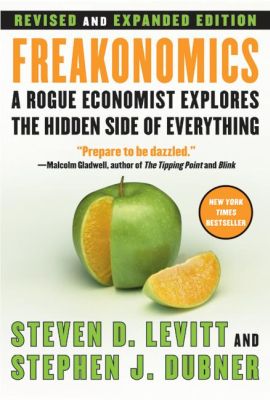

| FREAKONOMICS A Rogue Economist Explores the Hidden Side of Everything Steven D. Levitt Stephen J. Dubner New York: William Morrow, 2005 |
Rating: 5.0 High |
|||
| ISBN-13 978-0-06-073132-X | ||||
| ISBN 0-06-073132-3 | 242pp. | HC | $25.95 | |
Enrico Fermi would have been proud.
The famous physicist used to ask his students questions like, "How many piano tuners are there in the city of Chicago?" Answering such a question requires making plausible assumptions about the real world — in this example, estimating the number of pianos in Chicago, and how often they need to be tuned. The answer turns on the matter of incentives, and which among the competing incentives proves strongest.
Properly identifying incentives is what this book is all about. What possible incentive could parents have to name their child "Shithead"? (A female child at that. See page 190.) But usually incentives are more readily discernable, and accord with self-interest. The names people give their children reflect their hopes and aspirations for their offspring; they bestow names associated with high social standing, with popular historical figures, or with venerable institutions.
Steven Levitt is the rogue economist who comes up with the insights into incentives. Stephen Dubner is the New York Times reporter who interviews him and conveys those keen insights to the public. Keen they are; and sometimes controversial — as when Levitt realized that the reason why crime declined in the 1990s was not what the experts claimed; it was the advent of legal abortions in the 1970s. When poor women were able to get safe abortions, the children they would otherwise have been forced to raise1 in poverty, more likely than not to grow up anti-social, did not grow up at all.
Levitt offers more gems of insight, such as why drug dealers live with their mothers — an insight gained through his own extensive (and risky) field work.2 But the chief value of this book, in my opinion, lies in its historical anecdotes: how teachers in the Chicago Public School District who inflated their students' performance on standardized tests were detected, or how Stetson Kennedy sabotaged the Ku Klux Klan. Levitt's conclusions are often surprising and always worthwhile, and it was a joy to read about Kennedy's campaign.
Even though it is a well-written, entertaining and remarkably insightful book, this is not a keeper. Read it, enjoy it, pass it on. But look for anything else Levitt writes. It will repay you.
I found no grammatical errors, and I did not create an Errata page. But there is one glaring goof, a puzzlingly obvious one. Consider the following passage.
What if the blood donors had been offered an incentive of $50, or $500, or $5,000? Surely the number of donors would have changed dramatically. But something else would have changed dramatically as well, for every incentive has its dark side. If a pint of blood were suddenly worth $5,000, you can be sure that plenty of people would take note. They might literally steal blood at knifepoint. They might pass off pig blood as their own. They might circumvent donation limits by using fake ID. Whatever the incentive, whatever the situation, dishonest people will try to gain an advantage by whatever means necessary. – Page 24 |
Sure, plenty of people would want to cheat. But, as the old cop shows always told us, there must be motive and opportunity. Knowing how blood is donated, where is the possibility of passing off pig blood, or blood stolen from someone else? Some would fib to get past the donation limits; but this is self-limiting: Donated blood is tested for impurities like HIV, and frequent donations are not conducive to good health.

 To contact Chris Winter, send email to this address.
To contact Chris Winter, send email to this address.